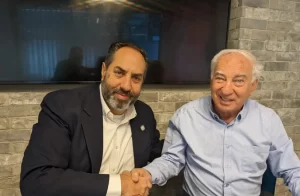IN JULY, newly-elected Israeli president and outgoing chairman of the Jewish Agency Isaac Herzog and chairman of the World Zionist Organization Yaakov Hagoel attend a farewell ceremony held in Herzog’s honor at the Jewish Agency in Jerusalem.
(photo credit: NOAM REVKIN FENTON/FLASH90)
The unspoken glass ceiling in the national institutions needs to be broken and not a day too soon.
From its origin in 1929, the Jewish Agency for Israel (JAFI) has been a daring and bold organization that accomplished the impossible time and time again. It led covert aliyah operations, defying the British mandate; served as the de facto government in pre-state Palestine; played a pivotal role in more than doubling Israel’s population in its first few years and in absorbing massive waves of olim; and again, in the 80s and 90s, spearheaded the migration and absorption of more than 1.5 million olim from the former Soviet Union and Ethiopia.
At the turn of the 21st century, JAFI pivoted and pioneered the shlichim (sending emissaries) enterprise as a way to strengthen the connection between Israel and the diaspora, infusing this bond with education and authentic engagement.
However, today JAFI finds itself at a crossroads. Since July, when former chairman of the Jewish Agency Isaac Herzog was selected as Israel’s president, the Agency has been locked in a political stalemate that has stymied many and left the organization leaderless for an extended period with this important role still unfilled. It is a matter of mystery why it would take nine months (so far) to select a new leader for this monumental organization. Which begs the critical question – what is going on with the Jewish Agency?

The Jewish Agency headquarters in Jerusalem (credit: YONATAN SINDEL/FLASH90)An endless, opaque, and convoluted process
The process that was put in place many years ago to elect a new head for the Agency may have been appropriate at one point in time but has since become untenable. According to JAFI’s by-laws, a selection committee was immediately established to lead the search process. Its appointed chairman, Yaakov Hagoel, the well respected and able chair of the World Zionist Organization, was also simultaneously installed as the interim chair of JAFI and has been serving in this capacity ever since.
As word of the search process spread, many qualified individuals responded. The initial finalists were invited to a round of interviews ahead of a November 2021 deadline. However, to complicate matters, according to the institutional process, a candidate would need to receive nine out of 10 votes in favor in order to receive the official nomination. By any measure, ninety percent agreement is a high standard, but especially so for Jewish communal organizations.
When no candidate was able to clear that threshold by the first deadline, the process was extended and expanded to include additional candidates. However, unlike in past selection efforts, the committee chose to publicly share the identities of the candidates.
It is noteworthy that up until Herzog’s selection as chair of JAFI in August 2018, it was an unwritten tradition for the selection committee to accept the prime minister’s and government’s recommendation. With Herzog’s selection back then and the rejection of Yuval Steinitz, then prime minister Netanyahu’s candidate, the rules of the game changed.
As this process continued, the selection committee received not only one but three official government candidates: Former MK Ruth Calderon, former minister Omer Yankelevitch and businessman Roby Spiegel. With no clear government candidate and with a nearly impossible threshold of ninety percent agreement, JAFI and the selection committee were placed in a political quagmire and a challenging position.
Bad timing
This vacancy in leadership could not have come at a worse time. Against the backdrop of rising incidents of global antisemitism and deepening disengagement of diaspora youth from Israel, Israel’s gates were effectively shuttered during much of the COVID-19 pandemic. Yet, for much of this time, there has been no effective lobby to advocate for Jewish communities to visit their homeland.
Beyond the lack of creative solutions, there has been rising frustration at not having a central figure to address diaspora concerns and channel those into practical policies. This vacuum has raised a series of questions about the transparency, process and criteria for selecting a new chair and to a larger extent the relevance of the Jewish Agency in the modern era.
Indeed, overseas colleagues have expressed increasing concern for the diminished role of JAFI’s diaspora leadership in asserting their voice and advocating for an appropriate representative for diaspora Jewry’s needs and issues. They claim that as the only real representative body to advocate for the Israel–diaspora relationship, JAFI needs a strong chair with a vision and ability to engage new constituents and communities.
New leadership is needed
We now find ourselves days away from the Agency’s Board of Governors meeting with no candidate who seems able to garner the necessary support in sight. This begs another question: Should and how can we fix a broken system?
As members of the Board of Governors convene, some of these ideas can provide a fertile starting point:
JAFI must modernize and make its selection process more transparent, efficient, and with fewer inherent conflicts of interest. It simply cannot afford such an opaque and unclear process.
A majority of nine out of 10 is not a reasonable standard in today’s political environment. The battles between the Israeli parties have extended to the national institutions, which now serve as a reflection of the undercurrents in Israel’s domestic political clashes.
Once the unwritten rules regarding the automatic selection of the prime minister’s candidate changed, the process must change as well. At the upcoming plenary, directors of JAFI should seek the formation of a governance committee to explore structural reforms to the succession of power and the re-clarification of the agency’s role vis-a-vis the Israeli government.
The unspoken glass ceiling in the national institutions needs to be broken and not a day too soon.
Today, the leadership of the Zionist movement has come to largely reflect the heads of the political parties and religious streams, and is mostly made up of senior males. This in turn has demonstrably led to a lack of diversity and female representation in the movement’s top roles.
There have been female presidents of the United Jewish Appeal, AIPAC, the current chair of the Conference of Presidents, and the Jewish Federations of North America. In Israel, there has been a female prime minister and we have many senior ministers in the current government. Mere months ago, the American Zionist Movement made history by electing Deborah Isaac as its first-ever female president. Yet, there has never been a female chair of any of the Zionist national institutions. It is time to change that and make history.
Several worthy female candidates are currently finalists in the selection process and have demonstrated the requisite experience and gusto to address JAFI’s pressing needs. Former MK Ruth Calderon and Deputy Mayor Fleur Hassan-Nahoum are talented, charismatic and dynamic leaders, who understand the Jewish diaspora communities and bring a breath of fresh air to the tired Jewish Agency. If there is a will, there’s a way.
In the end though, choosing a talented and qualified female chair for JAFI does more than just make history, it sends a message of greater inclusion in Jewish leadership. It is a message that I want my daughter and all daughters of Israel to witness and internalize. And while no candidate should ever be chosen based solely on their gender, the message that will be sent here is timely and of great importance.
Rather than making history, the alternative of further delays, non-representative leadership, a subdued and disengaged diaspora voice and lack of necessary reforms to outdated processes runs the risk of sending the Jewish Agency to the dustbin of history.
The writer is chairman of Kol Israel, the General Zionist faction in the national institutions: Keren Kayemet Le’Israel (KKL), World Zionist Organization, Jewish Agency and Keren Hayesod, and a board member of KKL.





